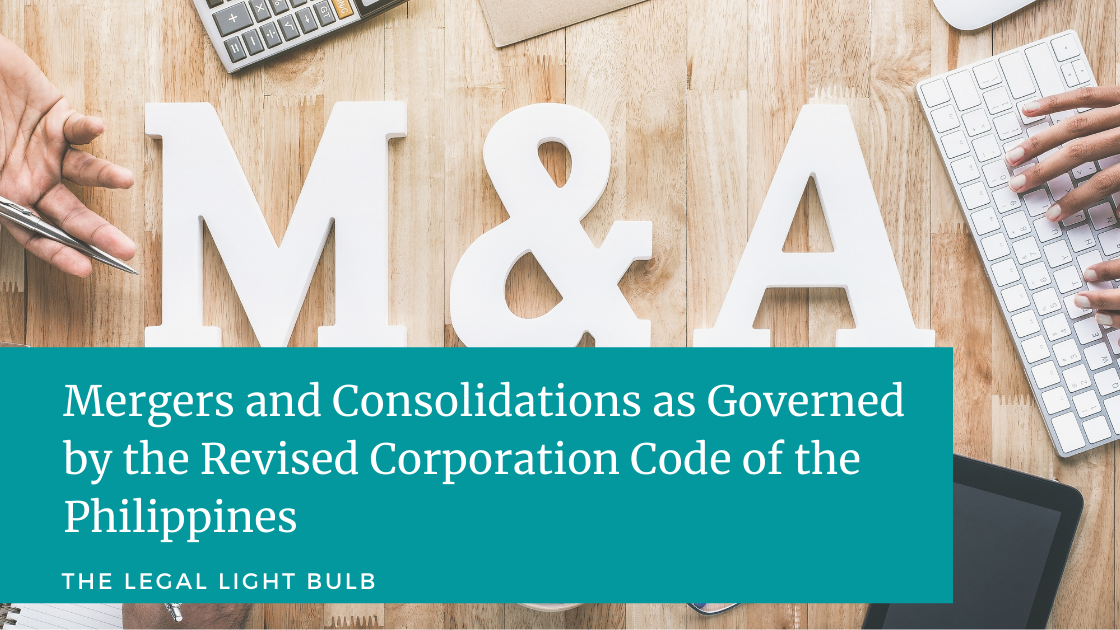MERGERS AND CONSOLIDATION
Corporations may decide to merge or consolidate because of various reasons. It could be because corporations want to increase their value that they normally cannot do alone or they want to diversify their businesses or acquire assets or many other motivations. However, corporations before entering into mergers and consolidations, they must need to carefully look at the provisions of the governing law, the Revised Corporation Code of the Philippines (RCCP).
WHAT IS A MERGER?
If two or more corporations merge into a single corporation which shall be one of the constituent corporations then there is a Merger (Article 76 RCCP).
The Supreme Court in the case of (Bank of Commerce vs Radio Philippines Network, Inc., et al, G.R. No. 195615, April 21, 2014) explained what a Merger is, saying that:
“Merger is a re-organization of two or more corporations that results in their consolidating into a single corporation, which is one of the constituent corporations, one disappearing or dissolving and the other surviving. To put it another way, merger is the absorption of one or more corporations by another existing corporation, which retains its identity and takes over the rights, privileges, franchises, properties, claims, liabilities and obligations of the absorbed corporation(s). The absorbing corporation continues its existence while the life or lives of the other corporation(s) is or are terminated.”
Bank of Commerce vs Radio Philippines Network, Inc. et al, G.R. No. 195615, April 21 2014
WHAT IS CONSOLIDATION?
If two or more corporations consolidate into a new single corporation which shall be the consolidated corporation (Article 76 RCCP).
“Consolidation is the union of two or more corporations into a single new corporation, called the consolidated corporation, all the constituent corporations thereby ceasing to exist as separate entities. The consolidated corporation shall thereupon and thereafter possess all the rights, privileges, immunities, franchises and properties, and assume all the liabilities and obligations of each of the constituent corporations in the same manner as if it had itself incurred such liabilities or obligations.” (Bangko Sentral ng Pilipinas)
WHEN DO MERGERS AND CONSOLIDATIONS TAKE EFFECT?
If two or more corporations decide to merge or consolidate, they must seek the approval of the Securities and Exchange Commission (SEC) before they can complete the same. The time that the SEC issues a certificate of merger or consolidation is the time of its effectivity.
It is to be noted, however, that if the corporations that are parties to a merger or consolidation includes banks or banking institutions, building and loan associations, trust companies, insurance companies, public utilities, educational institutions and other special corporations governed by special laws, the favorable recommendation of the appropriate government agency shall first be obtained.
WHAT ARE THE EFFECTS OF MERGERS OR CONSOLIDATIONS?
According to (Section 80, RCCP) these are the effects of a merger or consolidation
1. The constituent corporations shall become a single corporation which, in case of a merger, shall be the surviving corporation designated in the plan of merger; and, in case of a consolidation, shall be the consolidated corporation designated in the plan of consolidation;
2. The separate existence of the constituent corporations shall cease, except that of the surviving or the consolidated corporation;
3. The surviving or the consolidated corporation shall possess all the rights, privileges, immunities, and powers and shall be subject to all the duties and liabilities of a corporation organized under this Code;
4. The surviving or the consolidated corporation shall thereupon and thereafter possess all the rights, privileges, immunities and franchises of each of the constituent corporations; and all property, real or personal, and all receivables due on whatever account, including subscriptions to shares and other chooses in action, and all and every other interest of, or belonging to, or due to each constituent corporation, shall be deemed transferred to and vested in such surviving or consolidated corporation without further act or deed; and
5. The surviving or consolidated corporation shall be responsible and liable for all the liabilities and obligations of each of the constituent corporations in the same manner as if such surviving or consolidated corporation had itself incurred such liabilities or obligations; and any pending claim, action, or proceeding brought by or against any of such constituent corporations may be prosecuted by or against the surviving or consolidated corporation. The rights of creditors or liens upon the property of any of such constituent corporations shall not be impaired by such merger or consolidation.
APPRAISAL RIGHT OF A DISSENTING STOCKHOLDER TO A MERGER OR CONSOLIDATION
A stockholder of a corporation who dissents to its merger or consolidation has an appraisal right under (Section 81 of the RCCP). Meaning, a stockholder who does not agree to a merger or consolidation can demand the corporation to pay him or her the fair value of his or her shares.





